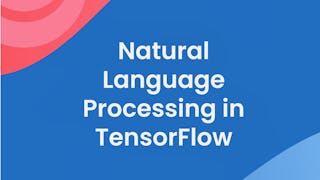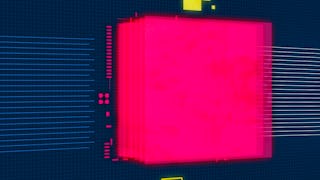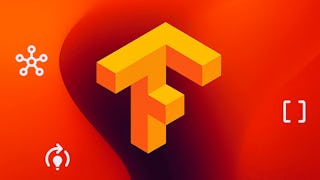If you are a software developer who wants to build scalable AI-powered algorithms, you need to understand how to use the tools to build them. This course is part of the DeepLearning.AI TensorFlow Developer Specialization and will teach you best practices for using TensorFlow, a popular open-source framework for machine learning.
Enjoy unlimited growth with a year of Coursera Plus for $199 (regularly $399). Save now.

Introduction to TensorFlow for Artificial Intelligence, Machine Learning, and Deep Learning
This course is part of DeepLearning.AI TensorFlow Developer Professional Certificate

Instructor: Laurence Moroney
402,476 already enrolled
(19,718 reviews)
Recommended experience
What you'll learn
Learn best practices for using TensorFlow, a popular open-source machine learning framework
Build a basic neural network in TensorFlow
Train a neural network for a computer vision application
Understand how to use convolutions to improve your neural network
Skills you'll gain
Details to know

Add to your LinkedIn profile
4 assignments
See how employees at top companies are mastering in-demand skills

Build your Software Development expertise
- Learn new concepts from industry experts
- Gain a foundational understanding of a subject or tool
- Develop job-relevant skills with hands-on projects
- Earn a shareable career certificate from DeepLearning.AI

There are 4 modules in this course
Welcome to this course on going from Basics to Mastery of TensorFlow. We're excited you're here! In Week 1, you'll get a soft introduction to what Machine Learning and Deep Learning are, and how they offer you a new programming paradigm, giving you a new set of tools to open previously unexplored scenarios. All you need to know is some very basic programming skills, and you'll pick the rest up as you go along. To get started, check out the first video, a conversation between Andrew and Laurence that sets the theme for what you'll study...
What's included
4 videos8 readings1 assignment1 programming assignment1 app item1 ungraded lab1 plugin
Welcome to week 2 of the course! In week 1 you learned all about how Machine Learning and Deep Learning is a new programming paradigm. This week you’re going to take that to the next level by beginning to solve problems of computer vision with just a few lines of code! Check out this conversation between Laurence and Andrew where they discuss it and introduce you to Computer Vision!
What's included
7 videos3 readings1 assignment1 programming assignment2 ungraded labs
Welcome to week 3! In week 2 you saw a basic Neural Network for Computer Vision. It did the job nicely, but it was a little naive in its approach. This week we’ll see how to make it better, as discussed by Laurence and Andrew here.
What's included
6 videos3 readings1 assignment1 programming assignment2 ungraded labs
Last week you saw how to improve the results from your deep neural network using convolutions. It was a good start, but the data you used was very basic. What happens when your images are larger, or if the features aren’t always in the same place? Andrew and Laurence discuss this to prepare you for what you’ll learn this week: handling complex images!
What's included
9 videos6 readings1 assignment1 programming assignment3 ungraded labs
Earn a career certificate
Add this credential to your LinkedIn profile, resume, or CV. Share it on social media and in your performance review.
Instructor

Offered by
Explore more from Software Development
 Status: Free Trial
Status: Free TrialDeepLearning.AI
 Status: Free Trial
Status: Free TrialDeepLearning.AI
 Status: Free Trial
Status: Free TrialImperial College London
 Status: Free Trial
Status: Free TrialDeepLearning.AI
Why people choose Coursera for their career




Learner reviews
19,718 reviews
- 5 stars
81.18%
- 4 stars
15.19%
- 3 stars
2.40%
- 2 stars
0.62%
- 1 star
0.58%
Showing 3 of 19718
Reviewed on Apr 5, 2020
It's a good hands-on exercise. I like to see more link to keras api document when we introduce new function in keras. However, Tensorflow document regarding keras api is yet in complete. Thank you.
Reviewed on Aug 14, 2020
This course is awesome and the way instructor teaches the topic is fantastic.I would definitely recommend this course for Ai enthusiast and tech enthusiast who are interested in learning Tensorflow.
Reviewed on Mar 8, 2019
Good intro course, but google colab assignments need to be improved. And submitting a jupyter notebook was much more easier, why would I want to login to my google account to be a part of this course?
Frequently asked questions
To access the course materials, assignments and to earn a Certificate, you will need to purchase the Certificate experience when you enroll in a course. You can try a Free Trial instead, or apply for Financial Aid. The course may offer 'Full Course, No Certificate' instead. This option lets you see all course materials, submit required assessments, and get a final grade. This also means that you will not be able to purchase a Certificate experience.
When you enroll in the course, you get access to all of the courses in the Certificate, and you earn a certificate when you complete the work. Your electronic Certificate will be added to your Accomplishments page - from there, you can print your Certificate or add it to your LinkedIn profile.
More questions
Financial aid available,



